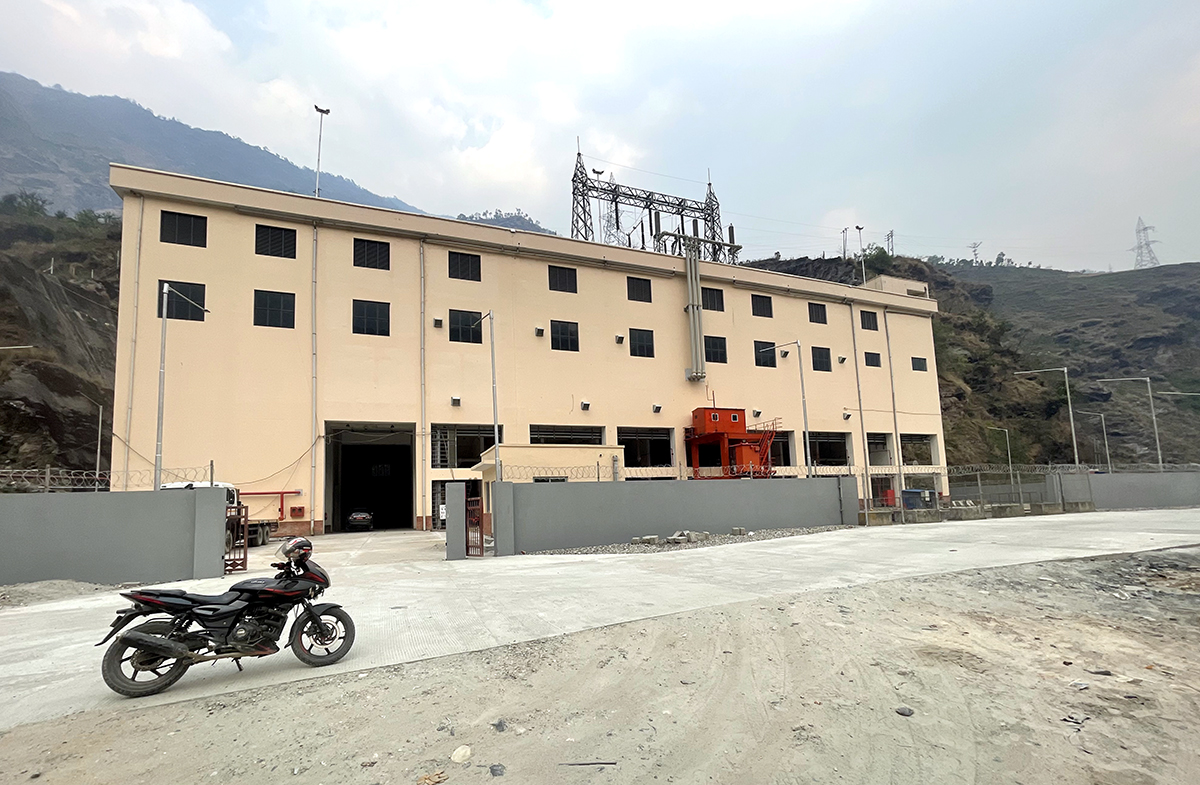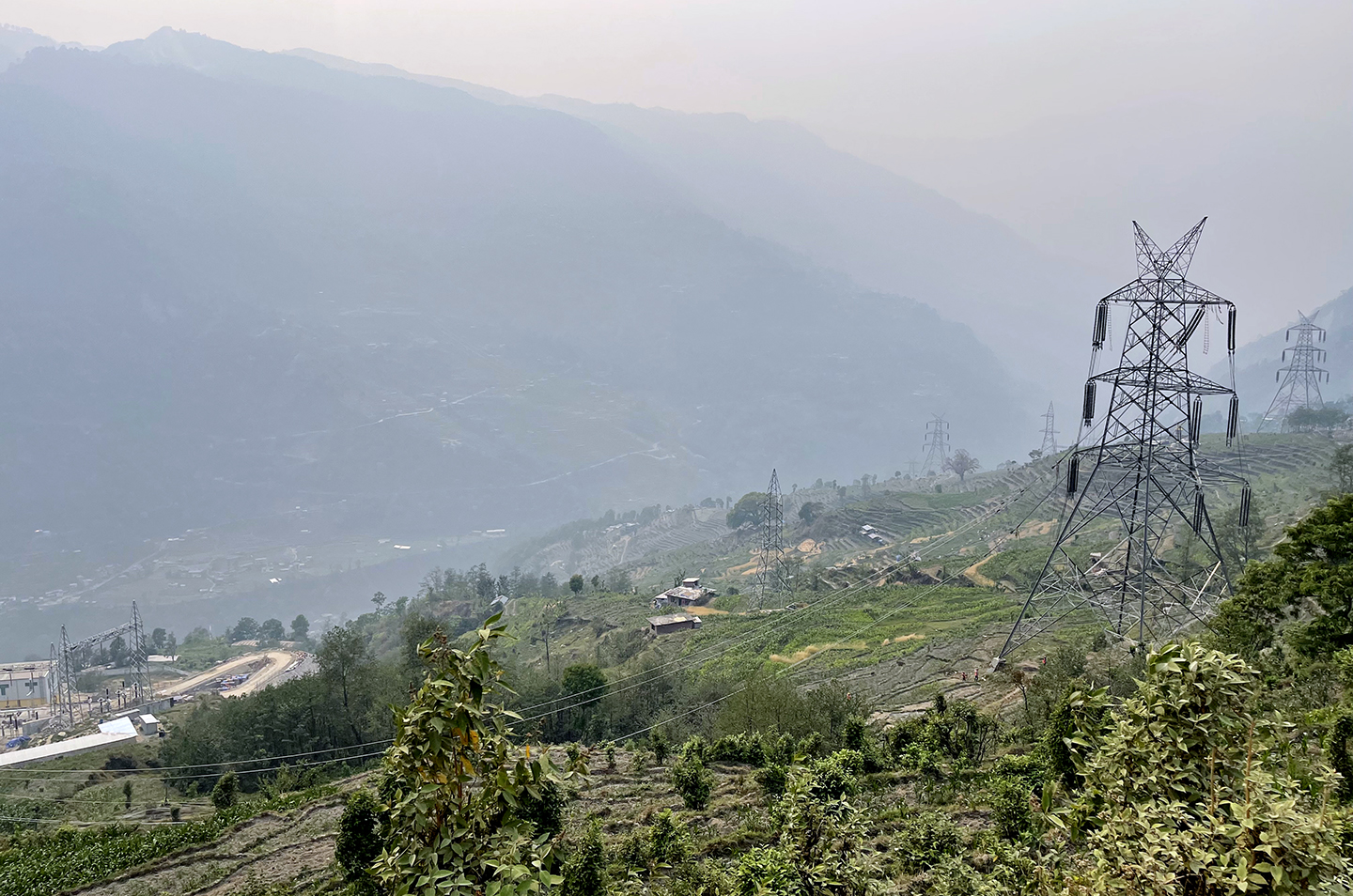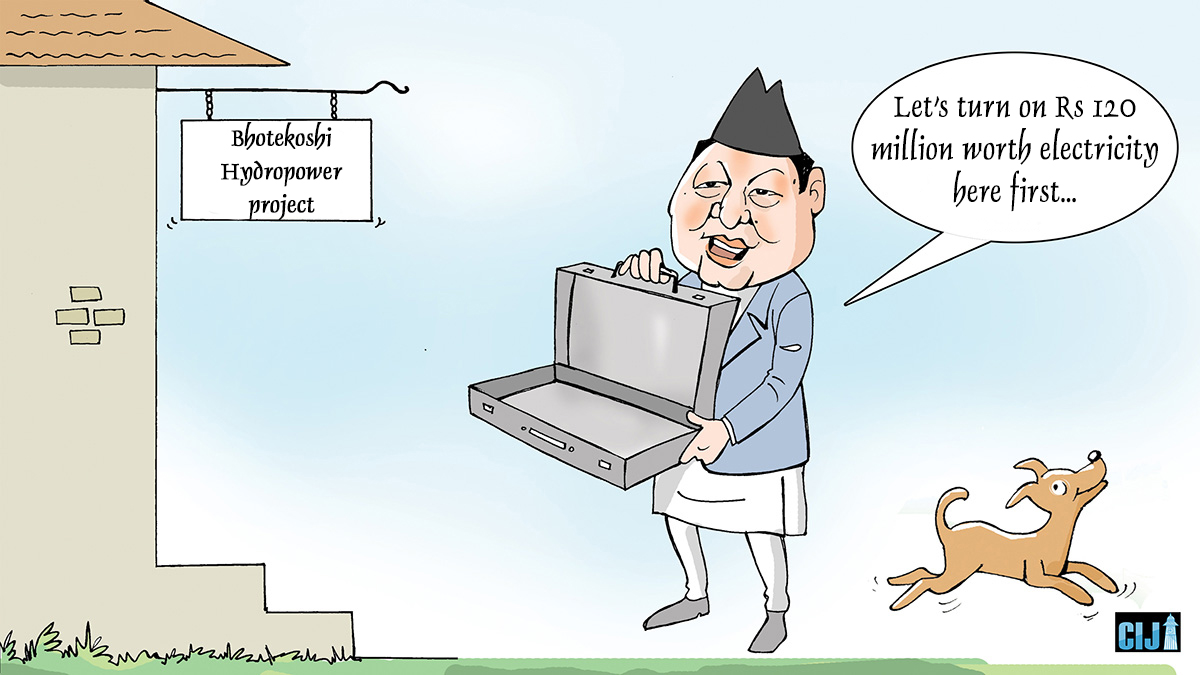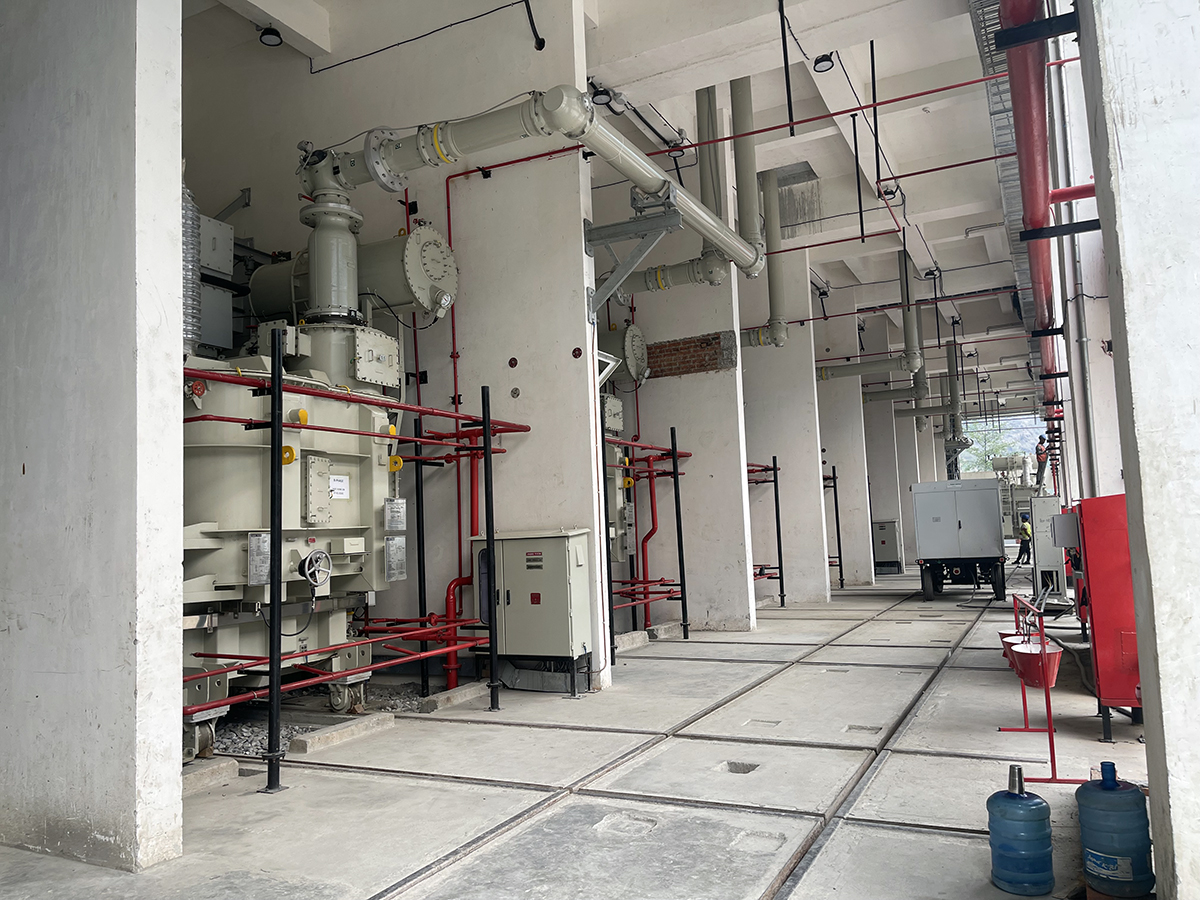After he was denied the Rs. 120 million he demanded, former minister and Nepali Congress lawmaker representing Sindhupalchok-2 Mohan Bahadur Basnet has disrupted work on extension of transmission line of Mid-Bhotekoshi Hydropower project under various pretexts.
Khilanath Dhakal | CIJ Nepal
Demanding a certain amount in the name of corporate social responsibility and compensation, lawmaker and former minister Mohan Bahadur Basnet has disrupted the transmission line extension work of Mid-Bhotekoshi Hydropower Project (102 MW) for a year.
His illicit demand has not only caused the project, which is being built with public-private partnership, to incur more cost; it has also served as an example of how political leaders disrupt development works.
The project, located at Baahrabise Municipality-5 in Sindhupalchok, is complete except for the installation of cables in six transmission towers. “But lawmaker Basnet has disrupted work after demanding money under various pretexts,” the project’s CEO Ramgopal Shiwakoti says.
According to Shiwakoti, the transmission line extension work was stopped on 2 July 2023, and since then, they have made repeated requests to facilitate the resumption of work, but Basnet has paid no heed to their concerns.
As many as 13 transmission towers have already been constructed for the four-kilometre area between the project site at Jambu in Baahrabise-5 and the Nepal Electricity Authority’s substation in Palaanti, Baahrabise-3. Of them, cables have been installed in seven towers at the two-kilometre area between Jambu and Kukhure. Basnet has obstructed the cable installation process in the rest of six towers, Shiwakoti said.

Mid-Bhotekoshi Hydropower Project. Photos by Khilanath Dhakal
Project officials claim that Basnet ordered his cousin Buddharaj Basnet to obstruct the work on transmission towers citing issues regarding compensation. Lawmaker Basnet has a home in Palaanti, the area where work is being obstructed.
The Mid-Bhotekoshi Hydropower Project, which started in 2068 BS, was scheduled to be inaugurated in coming Asar. But due to Basnet’s activities, the inauguration programme is now uncertain, project officials say.
According to Sandeep Joshi, chief engineer of Mid-Bhotekoshi Hydropower Project, the project is currently in the ‘testing and commissioning phase’, or at that phase where water is being released from headworks to the tunnel. “We have already tested it once by releasing the water into the tunnel,” Joshi said. “Only the work to operate the turbine and produce electricity remains.” The two turbines installed in the project, each of 34 MW, produce 102 MW electricity at once when they operate together.
Obstruction that cost Rs. 120 million
CEO Shiwakoti, member of the operating committee Narayan Prasad Acharya and lawmaker from Sindhupalchok-1 Madhav Sapkota all said that some people acting on Basnet’s cues have obstructed work, even if locals have supported it.
Shiwakoti and Acharya both said that at first Basnet had asked the project for Rs. 20 million for upgrading a primary health post in Baahrabise. This incident dates back to the last Mangsir when Basnet was the health minister.
“We had thought of providing the amount in installments but then he raised his demand to Rs 120 million,” Shiwakoti says. Acharya, the operating committee member, claims that when they reached Basnet’s home in Tinkune, Kathmandu in March, he said he’d stop the obstruction if the Rs. 120 million was deposited in the hospital’s account.
According to Acharya, Basnet has also asked for an additional amount for road upgrade under the project’s ‘institutional social responsibility’, even if the health post doesn’t fall within the area affected by the project. The areas affected by the project include Baahrabise Municipality’s wards 5, 6, 7, 8, and Bhotekoshi Rural Municipality’s wards 1 and 5. The health post lies in Baahrabise ward 9.
Baahrabise’s Mayor Balkrishna Basnet too accepted that the amount had been demanded through Mohan Basnet. “We aim to upgrade the 15-bed hospital to 50-bed strong, so the project’s transmission area should also be developed,” he said. “Then we had asked for Rs. 50 million, and I was also with Mohan dai [Basnet].”
Mayor Basnet, who is another cousin of Mohan Basnet, said that they, however, didn’t get the amount. Mayor Basnet said he didn’t know about the raised demand for Rs. 120 million, but guessed it might be for building construction of Kshyamadevi Secondary and road infrastructures. “There are a lot of such works to be done here,” he says
Requests to Deuba and Dahal for work resumption
Project CEO Shiwakoti and Acharya said after lawmaker Basnet raised his demand, they have been requesting everyone from the local administrators to the prime minister for clearing obstacles on the project.

Transmission towers installed for Mid-Bhotekoshi Hydropower Project.
“We have reached out to CDO Jhakka Prasad Acharya, DSO Santosh Khadka, and Nepal Electricity Authority MD Kul Man Ghising requesting their help for work resumption,” Shiwakoti said. “We have also talked to Madhav Sapkota, who is the lawmaker representing the constituency where the project falls.”
It was on lawmaker Sapkota’s effort that the team comprising Shiwakoti met with Prime Minister Pushpa Kamal Dahal and leader of the then coalition partner Nepali Congress Sher Bahadur Deuba.
“It was back in Poush 18, Mohanji was the health minister then,” lawmaker Sapkota says. “Dahal and Deuba had both committed to talking to Mohan Basnet for work resumption.” He added that he knows of Deuba asking Basnet to not obstruct work at the project.
But Mohan Basnet kept on asking for money, lawmaker Sapkota says. “It is unbecoming for a leader who should have instead helped get the project done by convincing the locals.”
CEO Shiwakoti said that NEA MD Kul Man Ghising is still ‘discussing’ work resumption with Basnet.
Ghising told CIJ that he is aware of obstruction in the project on the pretexts of compensation and that it is being discussed at the political level. “They ask for money, it happens,” he said. “While I haven’t talked with Mohan Basnet, there have been talks on the political level.”
Failure to install the transmission line before the time of electricity production has cost the state millions while the contractor would also claim compensation for extended project duration, Shiwakoti says.
Lawmaker Basnet, however, didn’t want to talk about it. In a phone conversation with CIJ, he said, “I don’t want to speak about it, you can do what you like, who gives you the direction? Nonsense!” Instead of responding to allegations against him, he grew outraged and also ordered the CIJ not to call again.
Engineer Joshi says that the project and NEA signed the electricity trade deal on 30 November 2023. According to which, the NEA would purchase power produced by the project at the rate of Rs. 8.40 during the dry season and Rs. 4.80 in the rainy season.
Calculating averages of both the seasons, power worth around Rs. 7.5 million would be produced in 24 hours, Joshi said, adding that the project has a capacity to produce electricity worth nearly Rs. 3 billion in a year.
The Nepal Electricity Authority has invested 10 percent in the Mid-Bhotekoshi project and the Chilime Hydropower Project, which is under the NEA, has invested 37 percent. Likewise, the residents of Sindhupalchok have invested 10 percent, other Nepali citizens 15 percent, depositors at Employees Provident Fund 19.5 percent, founding shareholders of Chilime 3.5 percent and officials at the Employees Provident Fund 1 percent.
Alongside, the Nepal Araniko Hydropower, Sindhu Investment Company, Sindhupalchok Hydropower and Sindhu-Bhotekoshi Hydropower have each invested 1 percent in the project.
The project’s responsibility
According to Shiwakoti, the project is spending Rs. 20 million annually as corporate social responsibility (CSR) in the affected areas. Moreover, the terms and conditions mentions that once the project starts producing electricity, it would spend 25 percent of royalty as CSR.
The project has been granting yearly figures of Rs. 11.9 million to Baahrabise Municipality and Rs. 7 million to Bhotekoshi Rural Municipality annually over the past nine years.
Likewise, for education development, it has provided an additional Rs. 140,000 to Baahrabise Municipality and Rs. 70,000 to Bhotekoshi every month.
In fiscal year 2079-80 BS, the project had allocated Rs. 52 million 320 thousand as CSR. For fiscal year 2080-81 BS, it had allocated Rs. 12 million under the same heading.
Moreover, for local infrastructure development and disaster prevention, the project has been spending up to Rs. 15 million annually, according to CEO Shiwakoti.
“He [Mohan Basnet] says work can’t move forward unless we do what he says,” Shiwakoti says. “When we sit in meetings, he tells us not to talk and only to listen.”
In their last meeting with Basnet on March 26, he asked us to provide Rs. 120 million along with 40 percent compensation to the local residents, Shiwakoti said.
The area of transmission line extension covers the lands of 166 individuals. Of them, 23 have already taken compensation. All 15 individuals on whose land 13 transmission towers were constructed have already taken compensation.
Of those who had refused compensation earlier in hopes of a better amount but are now willing to take the offered amount is Janaklal Roka of Baahrabise-5. Roka filed an application for compensation to the project in mid-April.
“I filed the application asking for compensation as law mandates. If I receive more than what was earlier promised, then I’d be even happier, but everyone should be given compensation uniformly,” Roka said.
Compensation a subject of perennial wrangling
There has been no hundred percent agreement of locals regarding compensation anywhere around the country where such projects are being developed. As leaders promise them better compensation, locals tend to obstruct work in the projects. This raises project costs as work gets stalled for long.
“If there is disagreement regarding compensation determination, then the Cabinet of Ministers will decide, and that takes place only in special conditions. I have not known the court ever overturning the decision made by the compensation determination committee,” says Mukesh Kafle, former managing director of Nepal Electricity Authority.
“If projects under state ownership provide money to any individual in particular, apart from under CSR and compensation to locals, then that would be an illicit and immoral move,” Kafle adds.
“Individuals asking money from projects under state ownership is illegal. Both the project and the individual should know this,” Kafle says. “If individuals demand money from projects under private ownership, then that would create even more obstacles.”
The compensation determination committee under the chief district officer (CDO) had said that owners of lands in transmission line areas of the Mid-Bhotekoshi project would get 20 percent compensation.

The committee comprised then CDO Ramesh Neupane, engineer of Electricity Development Department Kameshwar Prasad Yadav, project chief of Mid-Bhotekoshi 220kV transmission line Suryanath Bhutryal, chief administrative officer of Baahrabise Municipality Churamani Panthi, non-gazetted first-class officer of Sindhupalchok Land Revenue Office Binod Prasad Sapkota, and land owners Badri Basnet and Hari Bahadur Khadka.
Land owner Badri Basnet says that even if he participated in the committee’s meetings, he was not present during the time of signing the agreement. He is not happy that instead of taking the local residents into confidence, project officials are visiting political leaders. “Those who deserve compensation should receive it. Why ask Mohan Basnet and Buddharaj?” Basnet says.
Another local resident in the committee, Hari Bahadur Khadka, says that he has been targeted from all sides after he signed the deal. “Badriji was absent at that time, so I signed the deal. Now they target me saying I signed for a graft,” Khadka says. “The project should properly compensate the locals so they are happy. What else do I say!”
There’s no legal provision that mandates the revision of compensation amount once it’s agreed upon, says Sindhupalchok CDO Jhakka Prasad Acharya. Moreover, there’s also no legal provision that mandates over 20 percent compensation amount for lands acquired for transmission lines anywhere around the country, Acharya adds.
According to CDO Acharya, the subcommittee formed to fix the compensation amount for the land had submitted a report on 10 April 2023 and as per which, the compensation amount was finalised on 16 April 2023.
The subcommittee had taken the decision made during the construction of Kathmandu-Tamakoshi 400 kV transmission line in 2077 BS as reference.
The committee had determined Rs. 1.255 million compensation for each ropani of sloped land with no access to a horseway; Rs. 1.360 million for each ropani of rice fields with no access to a horseway; Rs. 1.715 million for a ropani of sloped land with access to a horseway; Rs. 1.775 million for a ropani of rice field with access to a horseway; and Rs. 2.068 million for a ropani of rice field with access to dirt road.
While land owners can’t build any structure and plant tall trees in the land that falls directly under the transmission lines, they can use it for other purposes. They also sell such land.
During the transmission tower construction in 2077 BS, locals had received 100 percent compensation for their land. According to the Land Acquisition Act, 2034 (1977), 100 percent compensation should be given for land within 15 metres on either side from where the tower is constructed. That land comes under the ownership of the project.
But there’s a provision for only 20 percent compensation for land within 15 metres on either side from where the cables are connected. These lands, however, fall under ownership of their existing owners themselves.
Basnet causing obstruction through his brother
According to the project’s public relations officer Ramkrishna Adhikari, on July 2 2023, cables were being connected to tower number 8 from tower number 7. And right at that time, a group including Mohan Basnet’s cousin brother Buddharaj Basnet appeared and announced, ‘No cables are going to get connected here. People haven’t gotten enough compensation,’ and obstructed work. After that, Buddharaj constituted a 9-member struggle committee on July 10, demanding additional compensation.
Then the district’s security officials invited Buddharaj and his team to a talk and said there was no provision to grant over 20 percent compensation for that land. After that, the project’s high-ranking officials began to engage in talks with Buddharaj, who is now the chair of Sindhupalchok Chamber of Commerce.
“After he [Buddharaj] said during discussions that this needed to be discussed with Mohan Basnet, we reached the latter’s home,” CEO Shiwakoti says. “And to our surprise, he demanded money.”

According to CDO Acharya, project officials have come to him repeatedly asking to facilitate work at transmission line construction. “We have told project officials about holding discussions with ward chairs, local unit chiefs, and lawmakers,” Acharya said.
A government official in Sindhupalchok says, “They say Mohan Basnet rules through his mouth. Nobody can protest what he says.”
Sindhupalchok-based Superintendent of Police Santosh Khadka too says that project officials have come to him asking for help in resuming work. “If the work is obstructed illegally, then we are ready to adopt the necessary legal process,” Khadka said.
Majority of land falling under the project area belongs to Mohan Basnet’s relatives. According to Shiwakoti, there was no obstruction until the cable was taken to tower number 7. But when cables reached Mohan Basnet’s village, obstruction began.
“The local residents also took part while deciding on compensation and they were satisfied,” CDO Acharya says. “But later, a struggle committee was formed, asking for 40-50 percent compensation. But the legal provisions do not mandate that, so we rejected their demand.”
Buddharaj has now dissolved the struggle committee that he led. He said that as per the agreement of 70-80 land owners, they have decided not to grant land to the project, so the struggle committee was dissolved on January 30. But the letter announcing the decision to not provide the land to the project is based on signatures of only two individuals – Buddharaj Basnet and another local Ramkaji Khadka.
Buddharaj claims that even though project officials are saying Mohan Basnet has demanded money from them, the reality is otherwise. “When people reached out to Mohandai asking for help, he asked the project to fulfill the locals’ demands,” Buddharaj said.
Meanwhile, Ramsharan Basnet, who was a member of the struggle committee, says that they do not want to obstruct the transmission line work, so they can move forward with an agreement.
“We do not say we won’t provide the lands, but we want a revision in compensation,” he said.
CEO Shiwakoti also says that he is clear that the project should offer some benefits to locals who are not satisfied with the government’s compensation. “But the project will not distribute money in a way that benefits an individual in particular,” he said.



